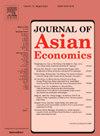The role of education in career inheritance in China
IF 2.9
3区 经济学
Q1 ECONOMICS
引用次数: 0
Abstract
Education is the main mode of human capital investment. The level of human capital based on education not only determines work opportunities but also influences the capacity of job achievement in the noncompetitive labour market. This work studies the impact of education on the occurrence and degree of occupational inheritance, empirically tests the heterogeneity of this impact against different backgrounds, and draws on the occupational choice model to analyse the mechanism of this impact through human capital. The results indicate that education has a significant negative effect on career inheritance and the degree of inheritance, which shows significant temporal heterogeneity due to market and employment system reforms; the closer the education level of parents and children is, the greater the probability of career inheritance. The impact mechanism test shows that education can address information friction in the labour market by improving workers’ information acquisition and utilization ability, as well as the noncognitive ability reflected by responsibility and patience, reducing barriers to human capital accumulation and thus negatively affecting career inheritance. Therefore, to guide occupational inheritance within a reasonable range and improve the job matching rate in the labour market, it is necessary to promote the high-quality development of education and improve workers’ comprehensive human capital level, including cognitive and noncognitive human capital, to enhance their career choice ability and sustained human capital accumulation ability. conversely, it is also necessary to further promote the development of the labour market, fundamentally reduce information asymmetry, and help workers make reasonable career choices.
教育在中国职业传承中的作用
教育是人力资本投资的主要模式。以教育为基础的人力资本水平不仅决定工作机会,而且影响在非竞争性劳动力市场上取得工作成就的能力。本文研究了教育对职业传承发生和程度的影响,实证检验了这种影响在不同背景下的异质性,并利用职业选择模型通过人力资本分析这种影响的机制。结果表明:教育对职业传承和职业传承程度有显著的负向影响,且受市场和就业体制改革的影响呈现显著的时间异质性;父母与子女的受教育程度越接近,职业继承的概率越大。影响机制检验表明,教育可以通过提高劳动者的信息获取和利用能力,以及责任和耐心所体现的非认知能力来解决劳动力市场中的信息摩擦,降低人力资本积累的障碍,从而对职业传承产生负面影响。因此,要引导职业传承在合理范围内,提高劳动力市场的岗位匹配率,就必须推动教育的高质量发展,提高劳动者的综合人力资本水平,包括认知人力资本和非认知人力资本,增强劳动者的职业选择能力和持续的人力资本积累能力。反过来,也需要进一步促进劳动力市场的发展,从根本上减少信息不对称,帮助劳动者做出合理的职业选择。
本文章由计算机程序翻译,如有差异,请以英文原文为准。
求助全文
约1分钟内获得全文
求助全文
来源期刊

Journal of Asian Economics
ECONOMICS-
CiteScore
4.70
自引率
9.40%
发文量
90
期刊介绍:
The Journal of Asian Economics provides a forum for publication of increasingly growing research in Asian economic studies and a unique forum for continental Asian economic studies with focus on (i) special studies in adaptive innovation paradigms in Asian economic regimes, (ii) studies relative to unique dimensions of Asian economic development paradigm, as they are investigated by researchers, (iii) comparative studies of development paradigms in other developing continents, Latin America and Africa, (iv) the emerging new pattern of comparative advantages between Asian countries and the United States and North America.
 求助内容:
求助内容: 应助结果提醒方式:
应助结果提醒方式:


